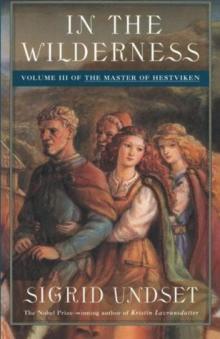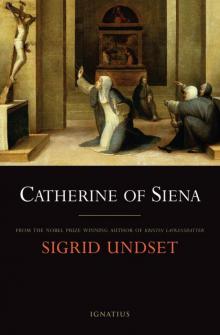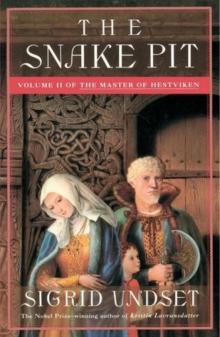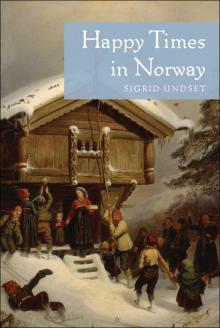- Home
- Sigrid Undset
Kristin Lavransdatter Page 15
Kristin Lavransdatter Read online
Page 15
The men looked at each other for a moment, quite foolishly, so that Kristin was almost about to smile. But then one of them said with an ugly leer that the road down to the bridge was a desolate one; it would not be advisable for them to go alone.
“No one would be so malicious or so stupid as to want to stop two maidens, especially two dressed in convent attire,” replied Kristin. “We prefer to go alone,” and then she handed them the money.
The man grabbed hold of her wrist, stuck his face close to hers, and said something about a “Kuss” and a “Beutel.” Kristin understood that they would be allowed to go unharmed if she would give him a kiss and her purse.
She remembered Bentein’s face close to hers, just like this, and for a moment fear seized her; she felt nauseated and sick. But she pressed her lips together, calling upon God and the Virgin Mary in her heart—and at that moment she heard hoofbeats on the path coming from the north.
Then she struck the man in the face with her coin purse so that he stumbled, and she shoved him in the chest so that he toppled off the path and tumbled down into the woods. The other German grabbed her from behind, tore the purse out of her hand, and tugged at the chain around her neck, breaking it. She was just about to fall, but she seized hold of the man, attempting to get her cross back. He tried to pull away; the robber had now heard someone approaching too. Ingebjørg screamed loudly, and the horsemen on the path came racing as fast as they could. They emerged from the thickets; there were three of them. Ingebjørg ran toward them, shrieking, and they jumped down from their horses. Kristin recognized the gentleman from Didrek’s loft; he drew his sword, grabbed the German she was struggling with by the scruff of his neck, and struck him with the flat of the blade. His men ran after the other one, seized him, and beat him with all their might.
Kristin leaned against the rock face. Now that it was over she was shaking, but what she felt most was astonishment that her prayer had been answered so quickly. Then she noticed Ingebjørg. The girl had thrown back her hood, letting her cloak fall loosely over her shoulders, and she was arranging her thick blonde braids on her breast. Kristin burst out laughing at the sight. She sank down and had to cling to a tree because she couldn’t hold herself up; it was as if she had water instead of marrow in her bones, she felt so weak. She trembled and laughed and cried.
The gentleman came over to her and cautiously placed his hand on her shoulder.
“No doubt you have been more frightened than you dared show,” he said, and his voice was pleasant and kind. “But now you must get hold of yourself; you acted so bravely while the danger lasted.”
Kristin could only nod. He had beautiful bright eyes, a thin, tan face, and coal-black hair that was cropped short across his forehead and behind his ears.
Ingebjørg had managed to arrange her hair properly at last; she came over and thanked the stranger with many elegant words. He stood there with his hand on Kristin’s shoulder as he spoke to the other maiden.
“We’ll take these birds along to town so they can be thrown in the dungeon,” he said to his men who were holding the two Germans, who said they belonged to the Rostock ship. “But first we must escort the maidens back to their convent. I’m sure you can find some straps to tie them up with. . . .”
“Do you mean the maidens, Erlend?” asked one of the men. They were young, strong, and well-dressed boys, and they were both flushed after the fight.
Their master frowned and was about to give a sharp reply. But Kristin put her hand on his sleeve.
“Let them go, kind sir!” She gave a small shudder. “My sister and I would be most reluctant to have this matter talked about.”
The stranger looked down at her, bit his lip, and nodded as he gazed at her. Then he gave each of the prisoners a blow on the back of the neck with the flat of his blade so that they fell forward. “Get going,” he said, giving them a kick, and they took off as fast as they could. The gentleman turned back to the maidens and asked them if they would like to ride.
Ingebjørg allowed herself to be lifted up into Erlend’s saddle, but it turned out that she couldn’t stay in it; she slipped down again at once. He gave Kristin a questioning look, and she told him that she was used to riding a man’s saddle.
He grasped her around the knees and lifted her up. She felt a thrill pass through her, sweet and good, because he held her away from himself so carefully, as if he were afraid to get too close to her. Back home they had never paid attention if they pressed her too close when they helped her onto her horse. She felt so strangely honored.
The knight—as Ingebjørg called him, even though he wore silver spurs3—offered the other maiden his hand, and his men leaped onto their horses. Ingebjørg now wanted them to go north, around the town and along the foot of the Ryen hills and the Marte outcrop, not through the streets. Her excuse was that Sir Erlend and his men were fully armed, weren’t they? The knight replied somberly that the ban against bearing weapons was not so strictly enforced for those who were traveling, or for all the people in town who were now hunting wild beasts. Kristin realized full well that Ingebjørg wanted to take the longest and least traveled road in order to talk more with Erlend.
“This is the second time we have delayed you this evening, sir,” said Ingebjørg.
Erlend replied gravely, “It doesn’t matter; I’m going no farther than to Gerdarud tonight—and it stays light all night long.”
Kristin was so pleased that he neither teased nor jested but spoke to her as he would to an equal, or more than that. She thought of Simon; she had never met any other young men of the courtly class. But this man was probably somewhat older than Simon.
They made their way down into the valley below the Ryen hills and up along the stream. The path was narrow, and the young leafy bushes flicked wet, fragrant branches at Kristin. It was a little darker down there, the air was chill, and the foliage was wet with dew along the streambed.
They moved slowly, and the hooves of the horses sounded muffled against the damp, grass-covered path. Kristin swayed in the saddle; behind her she could hear Ingebjørg talking, and the stranger’s dark, calm voice. He didn’t say much, answering as if preoccupied—as if he were feeling the same as she was, thought Kristin. She felt so strangely drowsy, but safe and content now that all the events of the day had slipped away.
It was like waking up as they emerged from the forest, out onto the slopes below the Marte outcrop. The sun had gone down and the town and the bay lay below them in clear, pallid light. The Aker ridges were limned with bright yellow beneath the pale blue sky. Sounds carried a long way in the quiet of the evening, as if they were coming from the depths of the cool air. From somewhere along the road came the screech of a wagon wheel, and dogs barked to each other from farms on opposite sides of the town. But in the forest behind them birds chirped and sang at the top of their voices now that the sun had gone down.
Smoke drifted through the air as dry grass and leaves were burned, and in the middle of a field a bonfire flared red; the great fiery rose made the clarity of the night seem dim.
They were riding between the fences of the convent’s fields when the stranger spoke to Ingebjørg again. He asked her what she thought would be best: Should he escort her to the door and ask to speak with Fru Groa, so that he could tell her how this had all come about? But Ingebjørg thought they should sneak in through the church; then they might be able to slip into the convent without being noticed. They had been gone much too long. Perhaps Sister Potentia had forgotten them because of the visit from her kinsmen.
It didn’t occur to Kristin to wonder why it was so quiet in the square in front of the west entrance of the church. Usually there was a great hubbub in the evening as people from the neighboring area came to the nuns’ church. And all around stood houses where many of the lay servants and corrodians lived. This was where they said farewell to Erlend. Kristin paused to pet his horse; it was black, with a handsome head and gentle eyes. She thought it looked like Morvin, the ho
rse she had ridden back home when she was a child.
“What’s the name of your horse, sir?” she asked as the animal turned his head and snuffled at the man’s chest.
“Bajard,” he said, looking at Kristin over the horse’s neck. “You ask the name of my horse, but not mine?”
“I would indeed like to know your name, sir,” she replied, with a little bow.
“Erlend Nikulaussøn is my name,” he said.
“Then we must thank you, Erlend Nikulaussøn, for your good assistance tonight,” replied Kristin, giving him her hand.
Suddenly her face flushed bright red; she pulled her hand halfway out of his grasp.
“Fru Aashild Gautesdatter at Dovre—is she your kinswoman?” she asked.
She saw with surprise that he too turned blood red. He let go of her hand abruptly and replied, “She is my mother’s sister. It’s true that I am Erlend Nikulaussøn of Husaby.” He gave Kristin such a strange look that she grew even more confused, but she pulled herself together.
“I should have thanked you with better words, Erlend Niku laussøn, but I don’t know what to say to you.”
Then he bowed, and she thought she should say goodbye, even though she would have preferred to talk with him longer. At the entrance to the church she turned around, and when she saw that Erlend was still standing next to his horse, she raised her hand and waved.
Inside the convent great fear and commotion reigned. Haakon had sent a messenger home on horseback while he himself walked through the town searching for the maidens, and servants had been sent out to help him. The nuns had heard that the wild animals had supposedly killed and devoured two children in town. This turned out to be a rumor, and the leopard—there was only one— had been captured well before vespers by several men from the king’s castle.
Kristin stood with her head bowed and kept silent as the abbess and Sister Potentia vented their anger on the maidens. She seemed to be asleep inside. Ingebjørg wept and spoke in their defense: they had gone out with Sister Potentia’s permission, after all, with the proper escort, and they were not to blame for what had happened afterward.
But Fru Groa told them to stay in the church until the clock struck midnight and try to turn their thoughts to spiritual matters and thank God, who had saved their lives and honor. “God has clearly shown you the truth about the world,” she said. “Wild beasts and the Devil’s servants threaten His children every step of the way, and there is no salvation unless you cleave to Him with entreaties and prayers.”
She gave each of them a lit candle and told them to go with Sister Cecilia Baardsdatter, who often sat in the church alone, praying into the night.
Kristin placed her candle on the altar of Saint Laurentius and knelt down on the prayer bench. She stared steadily into the flame as she said her Pater noster and Ave Maria. Gradually the glow of the taper seemed to envelop her, shutting out everything else surrounding her and the candle. She felt her heart open up, brimming over with gratitude and promises and love for God and His gentle Mother—she felt them so near. She had always known that they saw her, but on this night she felt that it was so. She saw the world as if in a vision: a dark room into which a beam of sunlight fell, with dust motes tumbling in and out, from darkness to light, and she felt that now she had finally moved into the sunbeam.
She thought she would gladly have stayed in the quiet night-dark church forever—with the few tiny specks of light like golden stars in the night, the sweet fragrance of old incense, and the warm smell of burning wax. With herself resting inside her own star.
This sense of joy seemed to vanish when Sister Cecilia silently approached and touched her shoulder. Curtseying before the altar, the three women slipped out of the small south entrance into the convent courtyard.
Ingebjørg was so sleepy that she got into bed without talking. Kristin was relieved; she was reluctant to be disturbed, now that she was thinking so clearly. And she was glad they had to keep their shifts on at night—Ingebjørg was so fat and sweated heavily.
Kristin lay awake for a long time, but the deep current of sweetness which had borne her as she knelt in the church would not return. And yet she still felt its warmth inside her; she fervently thanked God, and she sensed a feeling of strength in her spirit as she prayed for her parents and her sisters and for the soul of Arne Gyrdsøn.
Father, she thought. She felt such a longing for him, for all they had had together before Simon Darre had entered their lives. A new tenderness for Lavrans welled up inside her, as if there were a presentiment of maternal love and maternal sorrows in her love for her father that night. She was dimly aware that there was much in life that he had not received. She thought of the old black wooden church at Gerdarud, where at Eastertide she had seen the graves of her three little brothers and her grandmother—her father’s own mother, Kristin Sigurdsdatter—who had died as she gave birth to him.
What could Erlend Nikulaussøn be doing at Gerdarud? She could not fathom it.
She wasn’t conscious of giving any more thought to him that night, but the whole time the memory of his thin, dark face and his quiet voice had hovered somewhere in the shadows, just beyond the radiance of her soul.
When Kristin woke up the next morning, the sun was shining in the dormitory, and Ingebjørg told her that Fru Groa herself had sent word to the lay sisters that they should not be awakened for matins. They had permission to go over to the cookhouse now to have some food. Kristin felt warm with joy at the kindness of the abbess. It was as if the whole world had been good to her.
CHAPTER 3
THE FARMERS’ GUILD at Aker was dedicated to Saint Margareta, and every year began its meeting on the twentieth of July, which was Saint Margareta’s Day. On that day the brothers and sisters would gather with their children, guests, and servants at Aker Church to attend mass at the Saint Margareta altar. Afterward they would go to the guild hall, which stood near Hofvin Hospice; there they would drink for five days.
But because both Aker Church and Hofvin Hospice belonged to Nonneseter, and since many of the Aker peasants were tenant farmers of the convent, the custom had arisen for the abbess and several of the eldest sisters to honor the guild by attending the celebrations on the first day. And the young maidens of the convent who were there to be educated but who were not going to enter the order were allowed to go along and dance in the evening; and for this celebration they would wear their own clothes and not their convent attire.
So there was a great commotion in the young novices’ dormitory on the evening before Saint Margareta’s Day. Those maidens who were to attend the banquet rummaged through their chests and laid out their finery, while the others looked on and moped. Some of the girls had set small pots on the hearth and were boiling water to make their skin soft and white. Others were brewing something that they rubbed in their hair; afterward, when they had wound strands of their hair tightly around leather straps, they would have wavy and curly tresses.
Ingebjørg took out all that she owned of finery, but she couldn’t decide what to wear. Not her best leaf-green velvet dress, anyway; it was too costly and too elegant to wear to such a farmers’ guild. But a thin little maiden who was not going along—Helga was her name, and she had been given to the convent as a child—pulled Kristin aside and whispered that Ingebjørg would of course wear the green dress and her pink silk shift.
“You’ve always been kind to me, Kristin,” said Helga. “It’s most improper for me to get involved in such things, but I’m going to tell you anyway. The knight who escorted you home on that evening in the spring—I have both seen and heard that Ingebjørg has talked to him since then. They have spoken to each other in church, and he has waited for her up along the fenced road when she goes to visit Ingunn at the corrodians’ house. But it’s you that he asks for, and Ingebjørg has promised to bring you out there with her. I’ll wager that you’ve never heard about this before, have you?”
“It’s true that Ingebjørg has never mentioned this to
me,” said Kristin. She pursed her lips so the other maiden wouldn’t see the smile that threatened to appear. So that’s the kind of girl Ingebjørg was. “I expect she realizes that I’m not the type to run off to meetings with strange men behind house corners and fences,” she said haughtily.
“Then I could have spared myself the trouble to tell you this news, since it would have been more proper for me not to mention it,” said Helga, offended; and the two parted.
But all evening Kristin had to try not to smile whenever anyone looked at her.
The next day Ingebjørg dawdled for a long time, wearing only her shift. Kristin finally realized that the other maiden was not going to get dressed until she herself was done.
Kristin didn’t say a word, but she laughed as she went over to her chest and took out her golden-yellow silk shift. She had never worn it before, and it felt so soft and cool as it slid over her body. It was beautifully trimmed with silver and blue and brown silk at the neck and across the part of the bodice that would be visible above the neckline of her dress. There were also matching sleeves. She pulled on her linen stockings and tied the ribbons of the dainty blue-violet shoes, which Haakon had fortunately managed to bring home on that tumultuous day. Ingebjørg looked at her.
Then Kristin laughed and said, “My father has always taught me that we should not show contempt for our inferiors, but you are no doubt so grand that you won’t want to dress up for peasants and tenant farmers.”
Her face as red as a berry, Ingebjørg dropped the woolen shift from her white hips and put on the pink silk one. Kristin slipped her best velvet dress over her head; it was violet-blue and cut deep across the bodice, with slit sleeves and cuffs that trailed almost to the ground. She wrapped the gilded belt around her waist and slung her gray squirrel cloak over her shoulders. Then she spread out her thick blond hair over her shoulders and placed the circlet studded with roses on her forehead.

 In the Wilderness
In the Wilderness The Bridal Wreath
The Bridal Wreath Catherine of Siena
Catherine of Siena Marta Oulie: A Novel of Betrayal
Marta Oulie: A Novel of Betrayal The Snake Pit
The Snake Pit The Axe
The Axe Happy Times in Norway
Happy Times in Norway The Son Avenger
The Son Avenger Kristin Lavransdatter
Kristin Lavransdatter